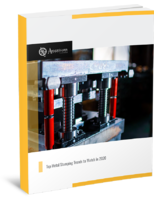Norsk Lastbærer Pool Pilots RFID Pallet Tracking in Norway's Food Industry
Share:
Norsk Lastbærer Pool pilots RFID pallet tracking in Norway's food industry
(UPM RFID, Tampere) - Norsk Lastbærer AS Pool (NLP), a Norwegian organization managing nationwide pallet leasing for retailers and manufacturers, is piloting RFID tags for tracking plastic pallets and totes. The pilot covers two food factories, Maaraud and Finsbråten, and two distribution centres for the Coop retail chain.
NLP was established in 2006 to reduce the environmental footprint of logistics operations in the Norwegian, fast-moving consumer goods (FMCG) supply chain. The RFID pilot is managed by Hrafn. The fixed RFID readers are provided by Impinj and the antennas by Intermec. The pilot utilizes UPM ShortDipole(TM) UHF EPC Gen2 RFID tags, which are specifically designed to deliver stable high performance in supply chain management applications.
All four corners of the plastic pallets are embedded with a UPM ShortDipole(TM) tag. Pallets loaded with goods are destined for either of two RFID-enabled Coop DCs. Handheld readers read the tags and encode them with the Serial Shipping Container Code (SSCC) into tag's user memory part. The readers transmit the ID number linked to the shipping details to the company's back-end system as well as to EPCIS software, where the data is stored and made available for web access. The loaded pallets pass through a reader portal as they are transferred to trucks. The portal reads each pallet's tags, confirming that the goods are being shipped and forwarding the information to Fosstrak software.
RFID technology increases visibility in the pallet users' processes, which helps minimize pallets loss. The costs for the reader infrastructure are included in NLP's pallet leasing fees, so the customer doesn't need to invest in a reading system. NLP offers standard readers from Intermec, and customers can use the hardware to optimize their internal operations.
So far, Norwegian FMCG companies have already used approximately 150,000 tagged plastic pallets leased by NLP without using RFID infrastructure to read the tags. During the pilot, which runs until May 2011, the participating companies will be able to track their products through the supply chain in real time, from site to retailers. NLP is targeting to standardize RFID infrastructure package suitable for any of the 800 or so facilities in Norway's consumer goods supply chain, including warehouses, DCs and retail stores.
NLP also plans to exploit RFID technology in its own operations, at the organization's washing and repair stations. "Pallets pass through RFID portals when entering and exiting the facility. Pallet repairs will be recorded by handheld readers to input and store information about each repair," says Geir Vevle, CTO, Hrafn. NLP will also introduce RFID in order to charge pallet users appropriate rental and handling fees, since RFID readers will record the exact time a pallet entered or left a particular facility. "A manual process can often be as inaccurate as 1 to 5 percent.
The ROI derived from the ability to automatically record arriving and departing pallets enables the RFID infrastructure to pay for itself immediately," Vevle says.
Lexit Group is installing and integrating the hardware and providing software which links users' back-end information, such as the order number and ship-to-location Global Location Number (GLN) code with the pallets' tag ID numbers. Telenor Ojects's Shepherd platform links data from read events to the EPCIS software, while also providing hardware monitoring by detecting errors such as connectivity problems with a reader or antennas that are out of service.
"The pilot tracks only the movements of pallets. The next step is the development of software which enables users to link pallets with the actual goods loaded onto them and track their products' movements," says Tom Romanich, IT Business Development Manager, NLP. By sharing data between suppliers and retailers, receipt and dispatch become more efficient and accurate.
For further information please contact:
Mr Mikko Nikkanen, Business Development Director, UPM RFID, tel. +358 400 766 979
Mr Tom Romanich, IT Business Development Manager, NLP, tel. +47 815 68 999
Mr Kristoffer Andersson, Technical Manager, NLP, tel. +47 47 20 22 67
About UPM RFID
UPM RFID, part of UPM's Engineered Materials business group, is the world's number one producer of HF and UHF radio frequency identification (RFID) tags and inlays. UPM RFID has a global service network consisting of factories in China and in the United States and a broad network of sales offices worldwide. The UPM Group employs around 22,000 people and it has production facilities in 15 countries. In 2010, UPM's sales amounted to EUR 8,9 billion. UPM's shares are listed on the Helsinki Stock Exchange.
Further information is available at www.upmrfid.com.
About Norsk Lastbærer Pool
NLP's business concept focuses on the development and management of return systems for recycling cargo carriers for the Norwegian grocery industry, in the most efficient way and at the lowest possible cost to the environment.
Norsk Lastbærer Pool is an established operator in the grocery sector community of suppliers and retailers. NLP handles over 5.5 million pallet trips in the Norwegian grocery industry every year. Currently 15 percent of these trips are made by plastic pallets containing four RFID tags. The target level is 70 percent. Further information is available at www.nlpool.no.




